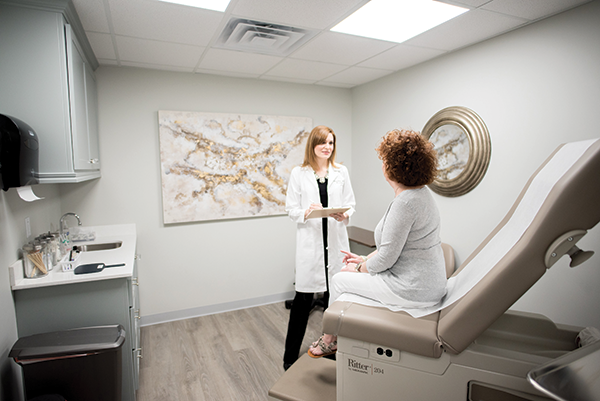
CIS Started in Houma, but Is Now Reaching Worldwide
October 17, 2018
SLMA Continues to Expand
October 17, 2018WE OFFER TIPS FOR WHEN TO AND NOT TO CALL IN SICK
Houma native Chad Guidry woke up not feeling right, but he got himself out of bed and went to work anyway.
By 10:40 a.m., that weird feeling turned into a severe sore throat and chills.
By 2:00 p.m., he was at his family doctor where he was being diagnosed with strep throat.
“I had no clue,” Guidry said. “Sometimes, you feel bad, but maybe you slept rough and you walk around a little bit and shake it off. I get seven sick days a year. It’s hard sometimes to know when to use some and when not to. It’s a juggling act.”
We’re here to help remedy some of those concerns.
We’ve spoken to medical professionals around the area and have created this go-to guide for when it is OK to call in sick from work and when it’s OK to tough it out and get to work.
SNIFFLES
A common symptom of feeling unwell are sniffles or congestion — something that doctors say occurs most often in the morning because of ceiling fans or box fans, among other things.
Sniffles without other symptoms are likely a sign of allergies and doctors say that allergies are 100 percent OK to work through.
Sniffles associated with fever or other symptoms are likely more complicated and should be accompanied by a doctor’s visit.
Allergy medicine is found over the counter and at low cost. But, doctors warn that antihistamines sometimes cause drowsiness, so be conscious of that when planning a long commute.
If allergy symptoms last for weeks, consider seeing a doctor who can prescribe low-dose, one-a-day medication that can limit the body’s reactions to allergens in the air.
VERDICT:Allergy-based illnesses are OK. Get to work.
FEVER
Fever is the sign of an infection in the body and many infections are contagious and/or need immediate medical care to be remedied without further complications. Doctors say that low-grade fevers (from 99 degrees to 100.5 degrees) do not necessarily need immediate medical care — especially if they go down with Tylenol or other over the counter medications. But it is still highly suggested that a worker stay home when feeling the chills because of the risk of infecting other employees.
VERDICT:If you feel the chills, make the call! Go back to bed!
EARACHE
There is no more nagging pain than an earache and earaches are almost always the sign of a contagious infection, which would place the employee at home. Most earaches are due to the swelling of the sinuses, which puts pressure against the ear drum, which causes inflammation and pain. But because of the sensitivity of the ears and because there are other possible causes of ear pain that are far more severe, a doctor’s visit is almost always encouraged to get to the root of the problem.
VERDICT:Stay away!
STOMACH ISSUES
These are some of the most difficult to judge. We’ve all eaten too much before bed and/or have had our dinner stay on our stomach, which causes a long night or early morning of digestion issues. Sometimes, stomach issues are just a negative reaction to an ingredient or an influx of acid in our stomach — two things that are mostly harmless. But if stomach issues turn to multiple episodes of diarrhea and/or vomiting, you’re likely suffering from a stomach virus, which is highly contagious and could wipe out an entire segment of an office in 24-48 hours. Use common sense. If loose stools are accompanied by several malaise, aches and vomiting, stay home. If the sick feeling tends to go away immediately after taking an antacid or other medication, it is likely diet-related and one is clear to work.
VERDICT:It depends. A common-sense approach is needed. If vomiting/aches are involved, stay home!
COUGHING/SORE THROAT
See also: sniffles. If a mild cough and sore throat are not accompanied by other symptoms and no fever is present, you’re likely good to go. But if there are fever, chills or constant thick mucus buildup, then it’s likely the sign of an infection, which will be contagious and not friendly to your office co-workers. A rule of thumb. The body usually is well-equipped to handle mild sinus-related issues within a couple of days. If you’re nearing a week of symptoms or over the counter medications are not helping, visit the doctor, because bronchitis, strep throat, mono, pneumonia or other ailments could be in play. But if coughing and a small ache are the only symptoms, drink a lot of fluids, get an extra hour of sleep and get back out there.
VERDICT: Get to work, assuming no fever is present.
HEADACHE
Headaches are tricky because literally anything can cause them. No literally … ANYTHING can cause them. Search headache on WebMD. You’ll get a list of ailments from innocent allergies to brain tumors and aneurisms. If a headache is present and there are no severe sinus-related symptoms, take a couple Tylenol and you’re more than likely going to shake it off pretty soon. But if the headache is accompanied by malaise, weakness, extreme pressure or a sensitivity to light, it’s likely a migraine and driving may be dangerous, so a call in to work may be best. If pain is extreme, get to a doctor right away, but 999 times out of 1,000, a headache is just that — a headache.
VERDICT:For non-migraines, it’s OK to go to work. •















